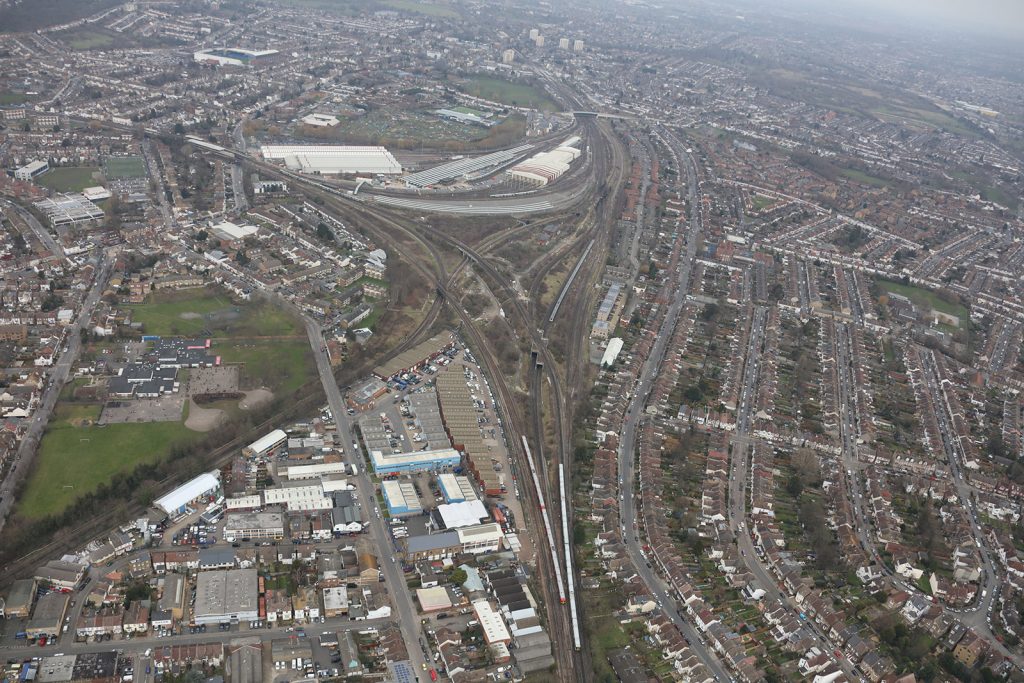
Network Rail is asking passengers and the community to help shape its proposals to remove the UK’s most operationally challenging railway junction as a public consultation on the scheme enters its final month.
The flat railway junctions, located to the north of East Croydon station, regularly cause delays to the 1,700 trains that pass through the area each weekday as trains often need to stop to allow others to pass in front of them. This creates a bottleneck that amplifies delays on the Brighton Main Line, its branches and the wider network.
Network Rail is proposing to replace the flat junctions with new viaducts, bridges and dive-unders to separate the tracks, creating clear routes for trains and removing the current need for trains to wait at red signals for others to pass in front, which would result in a significant boost in service reliability.
John Halsall, Network Rail managing director, southern region, said: “I’m really pleased to see we’ve already had a strong response to the public consultation, and encourage both Brighton Main Line passengers and communities along the line of route who have yet to do so, to take the time to give us their feedback.
“We know these proposals are critical as they are the only way to deliver a combination of more reliable, more frequent and faster services for passengers on the Brighton Main Line and its branches.
“Your views will help us shape our designs to deliver the best possible outcome for passengers, and wide support for the scheme will strengthen the case for investment in this region.”
Jonathan Sharrock, Chief Executive at Coast to Capital, said: “The Coast to Capital LEP area is one of the worst affected regions as a result of the restrictions needed to control the COVID-19 pandemic. Our strategic priority is to diversify and build resilience in our economy, supporting growth across all of our major sectors.
“Our ongoing area-wide Brighton mainline campaign aims to bring investment and long-term increases in railway capacity on the line which links our whole area and facilitates wider economic growth.
“Our region needs faster and more reliable transport links to enhance capacity, connectivity and resilience. Unlocking the Croydon Bottleneck is critical to the success of this; we strongly support the proposals and continue to urge local businesses and residents to respond to the consultation.”
Chris Philp MP, Croydon South, said: “Fixing the Croydon bottleneck is an incredibly important project that will not just benefit the people of Croydon, but will impact a significant part of the Brighton Main Line. It’s so important that the views of residents are heard on this crucial project and I urge as many people as possible to take part.”
Sarah Jones MP, Croydon Central, said: “I would encourage all those from Croydon and beyond to let their feelings known about important proposed changes to the rail network. There’s only a month left to do so and it doesn’t take long!”
Elliot Colburn MP, Carshalton and Wallington, said: “The Croydon bottleneck project will not only increase service reliability on the Brighton Main Line and across the service, but also address the growing need for additional rail capacity in south London and the suburbs.
“I strongly welcome these proposals, which will massively benefit all passengers across the network.
“As we enter the final month of the Network Rail consultation, I urge everyone living across south London, Surrey and Sussex to have their say.”
Steve White, Chief Operating Officer of Govia Thameslink Railway which operates Southern and Thameslink trains through the station, said: “This is one of the busiest stretches of railway in the country and a huge constraint on the services we can operate. We welcome this planned investment which will make a positive difference to our passengers by improving performance and boosting capacity. There is one month left so I would urge people to take part in the consultation and support this scheme.”


